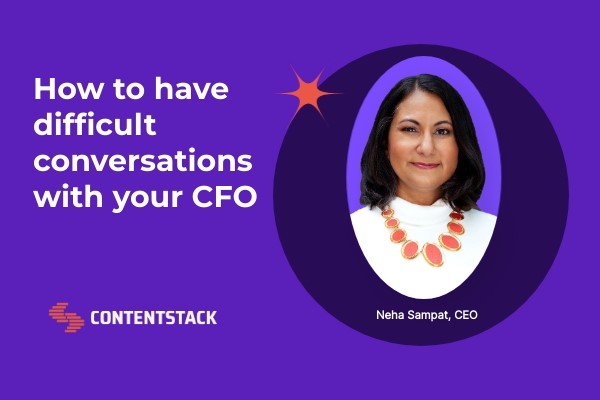How to have difficult conversations with your CFO

I've heard CFOs described as executives who are "exceptional at finding the smartest way to say no." While there may be some truth to that, CFOs are also motivated by the smartest reasons to say yes.
When that clicked for me earlier in my career, my approach to CFO conversations shifted. It wasn't about drowning them in data or trying to convince them my idea was the one; it was about painting a picture.
That picture should tell a simple story: where the organization is now and where it could be if we make a change. As Chief Digital Officer of Dawn Foods Bob Howland said in a recent episode of the People Changing Enterprises podcast: "Everyone wants to be part of success. Everyone wants to be part of the future."
Given the economic environment, many of us are having more conversations with finance than we're used to. So, I thought I'd share some of my strategies for fruitful CFO conversations here.
Face Issues Early and Head-On
Dawn Foods' Bob Howland calls this: "Be the bringer of bad news." Howland joined Dawn Foods in 2019 to propel the 100-year-old baking ingredients company into its next 100 years. Before Howland, orders were only taken by hand. His "bad news" was that their future wasn't bright if they didn't become an agile organization. Digital transformation hit the baking industry, too.
And he told the CFO that within his first few days on the job. Talk about early. But he also came up with a solution: to release a beta ecommerce site in six weeks built on composable architectures and get some results. That eventually became a full-blown solution in 22 weeks.
As Bob said, "If something is broken, tell the people that should know right away. Then figure out what's the action and who should take it?"
"Broken" to a CFO typically boils down to one of two things: something is costing us (or will cost us) a lot of money with no return in the long run or competition is eating our lunch. Know what the problem is going in and get rid of the noise around it to focus your conversation with the CFO. Noise can be anything from emotion, to office politics, to vanity issues that don't get you closer to the heart of the problem.
Find a Common Language
There's a reason I'm CEO and David Overmyer is Contentstack's CFO: Finance is not my area of expertise. But, here's the thing. We share a passion, which is scaling high-performing organizations in sustainable and purpose-filled ways. So, when we talk about allocating money, the underlying question isn't how much it will cost, but where will that spend take us?
We focus on a few key metrics for business-as-usual meetings. Those include ARR, CAC, gross margins, and customer retention. When new opportunities arise, we agree on the overriding KPIs together and then dig deeper.
Come up with a common language upfront. Don't risk derailing a meeting with jargon. Once questions like "what does that mean" start springing up, you've lost your way.
Let me challenge you with one additional perspective on common language: It doesn't have to be about words or numbers. Values can take the lead.
When March 2020 hit, a lot of companies responded with layoffs. Since David and I agreed when we first started working together that taking care of our people was our highest priority, we came up with creative solutions — executive pay cuts, investing in training and development — to pandemic problems. For us, brains and heart matter.
Find (or Make) an Advocate
If you're as lucky as I was with David, you may make an ally out of your CFO. I would go so far as calling him a mentor. But for most people, that's out of reach. In the podcast, Howland shared the golden question that opened the door toward marketing/finance partnership and transformation: "Who is the most trusted person on your team?"
Howland turned that person into an e-commerce expert and an advocate. It took time and education. Mostly, it took enablement — sharing information and allowing him to come to his conclusions. Author Bernard Desmidt called this mindset "win with" vs. "win over" in CFO Magazine this year.
Allowing this slow journey to unfold builds trust, which improves the relationship and, ultimately, the organization in the long run.
I was lucky early in my career to participate in Crucial Conversations training. A lot of that training is reflected in this piece. In Crucial Conversations, opinions tend to differ, and the stakes and emotions are high. Conversations with finance are often like this.
But if handled properly, these conversations can create breakthroughs that unlock the potential of people and organizations.
About Contentstack
The Contentstack team comprises highly skilled professionals specializing in product marketing, customer acquisition and retention, and digital marketing strategy. With extensive experience holding senior positions at renowned technology companies across Fortune 500, mid-size, and start-up sectors, our team offers impactful solutions based on diverse backgrounds and extensive industry knowledge.
Contentstack is on a mission to deliver the world’s best digital experiences through a fusion of cutting-edge content management, customer data, personalization, and AI technology. Iconic brands, such as AirFrance KLM, ASICS, Burberry, Mattel, Mitsubishi, and Walmart, depend on the platform to rise above the noise in today's crowded digital markets and gain their competitive edge.
In January 2025, Contentstack proudly secured its first-ever position as a Visionary in the 2025 Gartner® Magic Quadrant™ for Digital Experience Platforms (DXP). Further solidifying its prominent standing, Contentstack was recognized as a Leader in the Forrester Research, Inc. March 2025 report, “The Forrester Wave™: Content Management Systems (CMS), Q1 2025.” Contentstack was the only pure headless provider named as a Leader in the report, which evaluated 13 top CMS providers on 19 criteria for current offering and strategy.
Follow Contentstack on LinkedIn.





.svg?format=pjpg&auto=webp)
.svg?format=pjpg&auto=webp)
.png?format=pjpg&auto=webp)






.png?format=pjpg&auto=webp)


